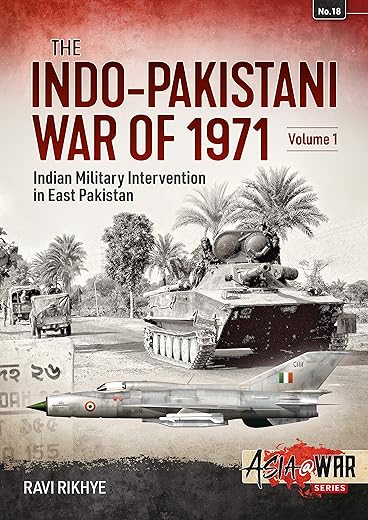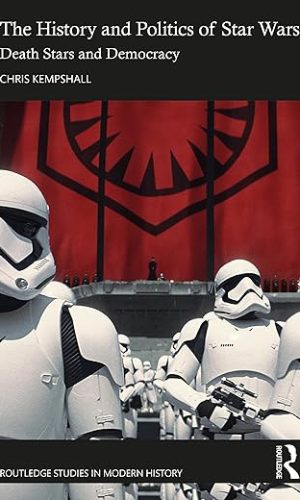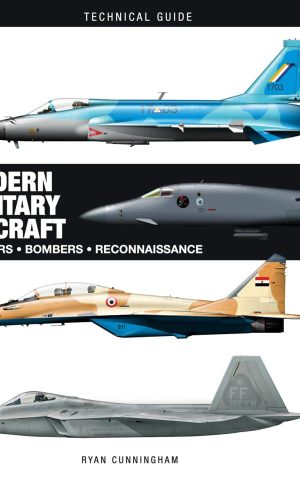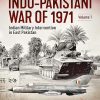Indo-Pakistani War of 1971: Volume 1: Birth of a Nation (Asia@War)
£13.70£19.00 (-28%)
In 1970, East Pakistan voted for independence and armed rebellion. A quick and nasty counterinsurgency suppressed the rebellion. India, seizing the chance to change the balance of power, first backed East Pakistan, then on 21 and 22 November 1971 invaded with eight divisions. India planned also to attack West Pakistan to recover Kashmir, but at the last moment the offensive was called off due to Soviet pressure. Pakistan attacked pre-emptively, and an all-out war resulted. East Pakistan was overrun by India on 16 December; the US and Soviet forced a ceasefire in the West only a day later. For the first time in 800 years, a predominantly Hindu army defeated a Muslim army.
Through extensive use of official records and participant recollections, rare photography and authentic colour profiles, Ravi Rikhye tells the captivating story of the biggest military conflict fought between India and Pakistan to date, and the war that resulted in emergence of Bangladesh as an independent nation.
Read more
Additional information
| Publisher | Helion and Company (15 Sept. 2020) |
|---|---|
| Language | English |
| Paperback | 84 pages |
| ISBN-10 | 1913118630 |
| ISBN-13 | 978-1913118631 |
| Dimensions | 20.96 x 0.64 x 29.21 cm |










by Imran Chowdhury BEM
“Indo-Pakistani War of 1971: Volume 1: Birth of a Nation” by Ravi Rokhye is a small but incredibly impactful book that has left a lasting impression on me. As a descendant of Bengali freedom fighters, I have witnessed the events of the 1971 Bangladesh Liberation War unfold before my eyes, and Rokhye’s work has added a new dimension to my understanding of this pivotal period in history.
One of the most striking aspects of this book is its size. Despite being a compact volume, it is packed to the brim with a wealth of information. Rokhye’s ability to condense such a significant historical event into a concise narrative is truly commendable. This makes the book accessible to a wide range of readers, from history enthusiasts to students and scholars, who may not have the time to delve into lengthy tomes.
Rokhye’s meticulous research shines through in every page of the book. His attention to detail and dedication to accuracy are evident, and I found myself constantly impressed by the depth of his knowledge. The book is a treasure trove of facts, figures, and firsthand accounts that provide a comprehensive overview of the events leading up to the birth of Bangladesh as an independent nation.
What truly sets this book apart is Rokhye’s narrative style. He weaves together the historical facts with personal stories and anecdotes, making the book not only informative but also deeply engaging. As someone with a personal connection to the Bangladesh Liberation War, I appreciated the way Rokhye brought the human aspect of the conflict to the forefront. It’s not just a dry recitation of facts; it’s a story of courage, sacrifice, and the indomitable spirit of a people determined to gain their freedom.
As a writer myself, focused on the history of the Bangladesh Liberation War, I consider Ravi Rokhye’s work to be an invaluable asset to my research and writing. His book has provided me with a wealth of primary and secondary source material, and his insights have inspired me to delve even deeper into this important chapter of history. I eagerly await Volume 2 of this series, as I’m confident it will be another masterpiece of historical storytelling.
In conclusion, “Indo-Pakistani War of 1971: Volume 1: Birth of a Nation” by Ravi Rokhye is a remarkable book that deserves a place on the bookshelves of anyone interested in the history of the Indian subcontinent. Its small size belies the vast amount of information it contains, and Rokhye’s well-researched narratives make it a must-read for history enthusiasts and researchers alike. This book has enriched my understanding of the Bangladesh Liberation War, and I look forward to delving deeper into its pages as I continue my own writing on this important topic.